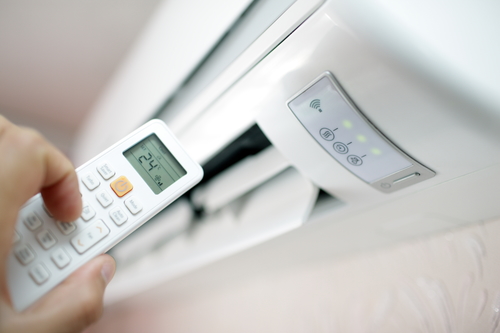Spring is about to turn the corner and enter your home, but maybe you have a few concerns about the weather heating back up again. If you’ve ever experienced problems with your air conditioner, perhaps you don’t relish the idea of paying to run it for the next several months. In fact, you may be considering alternatives to air conditioning so that you never have to deal with your cooling system again. Before you jump the gun and junk your AC though, consider each of your other options carefully. Alternatives to air conditioning certainly exist, but will they provide you with the comfort and convenience you need?
Let’s examine each of the alternatives to air conditioning you could use in California. Below is a list of strategies and devices that people commonly turn to instead of air conditioning. We’ll describe each one in detail and list its pros and cons so you can decide if it’s worth using one of these to replace your current system for good.
- Buy Fans… Lots of Fans. Next to air conditioners, fans are probably the single appliance most associated with providing relief from hot weather. However, they are of limited use in actually lowering the temperature in your home. While blowing air can create a certain degree of wind-chill, fans will be ineffective during particularly aggressive heat waves. For best results, they should be used with air conditioners instead of as a replacement for them.
- Leave Your Windows Open. Opening your windows can help you cool down your house, but only when the temperature outside is lower than the temperature inside. On particularly bright and sunny days, open windows may cause your home to become hotter, so be sure to use this method judiciously. However, opening your windows can improve the air quality in your home.
-
- Shut Your Drapes. Closing your blinds or drawing your curtains can prevent sunlight from entering your home through windowpanes and create a greenhouse effect. While this will not necessarily make your home cooler, it will help you avoid boiling during unusually hot days. You’ll just have to become used to living in a room (or a home) without a view of the outside.

- Shut Your Drapes. Closing your blinds or drawing your curtains can prevent sunlight from entering your home through windowpanes and create a greenhouse effect. While this will not necessarily make your home cooler, it will help you avoid boiling during unusually hot days. You’ll just have to become used to living in a room (or a home) without a view of the outside.
- Avoid Using Appliances that Produce Heat. Uncomfortable levels of heat are not always produced by the weather outside. They can also occur as the result of running appliances that heat up as you use them. Ovens are a prime example, so consider replacing yours with a slow cooker. You can also run cold water through your faucets and fixtures.
- Stock Up on Cool Treats. Physical comfort can come from within as well as without and no, we’re not encouraging you to take up yoga. However, we might suggest that you invest in a box or two of popsicles. Eating specific foods may help lower your body temperature temporarily from the inside, which can be a real blessing on hot days. Then again, you might find yourself needing to hit the gym to work off those extra calories—and you’ll probably want to make sure any facility you’re sweating in has air conditioning.
- Make Effective use of Ice Packs. Remember the last time you crawled into bed and felt cool sheets pressing luxuriously against your skin? If you don’t, you’re probably missing out on one of the best ways to keep cool during those long, sweltering summer nights. Keep ice packs in your freezer and put a few in your bed an hour or so before you plan on retiring for the evening. Take them out just before you tuck yourself in, and you’ll feel totally relaxed under the covers. Think of it as a reverse hot water bottle!
- Soak Yourself. Chilly water isn’t just for drinking and freezing. Submerging yourself in cool H20 can also be a terrific way to beat the heat around the house. If you have kids, fill up the inflatable pool and let them play in the backyard (just be sure to have plenty of sunscreen on hand). If you need something a little more dignified for yourself, consider taking cold baths or showers when you start to sweat.
- Invest in an Evaporative Cooler. Evaporative coolers put liquid water into the air by vaporizing it. Similar to air conditioners, they can be a reliable way to stay cool during hot weather. Evaporative coolers are cheaper than air conditioners and may also prove more energy efficient—provided that you only purchase one. In larger homes, the costs of buying multiple coolers and running them at once may offset these benefits. Plus, they have a side-effect of adding moisture to the air, which can create a humid sensation inside your home.
There are many alternatives to air conditioning, but they may not provide you with the same benefits as a well-maintained HVAC. In most cases, it’s best to use the suggestions above as well as servicing and using your air conditioner regularly. Doing so can prevent stress to the system and allow you to cut down your utility costs while still keeping cool in warm weather.
FAQ Section: Alternatives to Air Conditioning
1. What Are the Most Effective Alternatives to Air Conditioning?
When air conditioning isn’t an option, there are several effective alternatives. Using fans, especially ceiling fans, can circulate air and create a wind-chill effect. Evaporative coolers are also popular, especially in dry climates, as they cool the air by evaporating water. Additionally, passive cooling methods like keeping windows open at night and closing blinds during the day can significantly reduce indoor temperatures. However, these methods may not be as effective during extreme heat waves.
2. Can Opening Windows Really Cool Down My Home?
Yes, opening windows can help cool your home, but only when the outside temperature is lower than the inside. It’s most effective to open windows at night or early in the morning when it’s cooler outside. However, during the day, especially on hot and sunny days, keeping windows closed and shades drawn is better to keep the heat out.
3. How Can I Use Ice Packs to Stay Cool Without AC?
Ice packs can be an effective way to stay cool, especially during hot nights. Place ice packs in your bed about an hour before you go to sleep, then remove them just before you get in. This method cools the sheets and provides a refreshing sensation as you fall asleep. You can also use ice packs on pulse points, like your wrists and neck, to cool down quickly.
4. Are Evaporative Coolers a Good Replacement for Air Conditioners?
Evaporative coolers can be a good alternative to air conditioners, particularly in dry climates. They use water to cool the air, making them more energy-efficient and environmentally friendly than traditional ACs. However, they are less effective in humid environments and can add moisture to the air, which might be uncomfortable for some people.
5. Why Should I Avoid Using Heat-Producing Appliances During the Day?
Using appliances that generate heat, like ovens and stoves, can raise the temperature in your home, making it harder to stay cool. It’s best to use these appliances early in the morning or late in the evening when it’s cooler outside. You might also consider alternatives like slow cookers or microwave ovens, which produce less heat.
6. How Does Closing Drapes Help in Cooling My Home?
Closing drapes or blinds helps block out the sun’s rays, preventing them from heating your home through windows. This can reduce the greenhouse effect inside your home, keeping the indoor temperature lower. Using thermal or blackout curtains can enhance this effect, especially during the hottest parts of the day.
7. Are Fans Effective Enough to Replace Air Conditioning?
Fans can provide relief from heat by creating a wind-chill effect, but they don’t actually lower the room’s temperature. While fans can make you feel cooler, they are less effective during extremely hot weather. In such cases, combining fans with other cooling methods, like evaporative coolers or keeping the space well-ventilated, can be more effective.
8. Is It More Energy-Efficient to Use Fans and Ice Packs Instead of AC?
Using fans and ice packs is generally more energy-efficient than running an air conditioner, as fans use significantly less electricity. However, the comfort level might not be the same, especially in very hot climates. For energy savings without sacrificing comfort, consider using a combination of fans, ice packs, and evaporative coolers.
9. What Are the Benefits of Soaking in Cold Water During Hot Weather?
Soaking in cold water, whether by taking a cold shower or dipping in a pool, can be an immediate way to lower your body temperature. It can be particularly refreshing during heat waves, providing relief that lasts even after you dry off. This method also conserves energy compared to running an air conditioner all day.
10. Is It Worth Investing in an Evaporative Cooler?
Investing in an evaporative cooler can be worthwhile, especially if you live in a dry climate. These coolers are more affordable to operate than traditional air conditioners and can be effective in cooling small to medium-sized spaces. However, consider the initial cost and the ongoing maintenance, as they require water and regular cleaning to function optimally.
Check with us here at Valley Comfort Heating and Air, our customers love our attention to detail and our friendly, affordable service. (707) 539-4533




